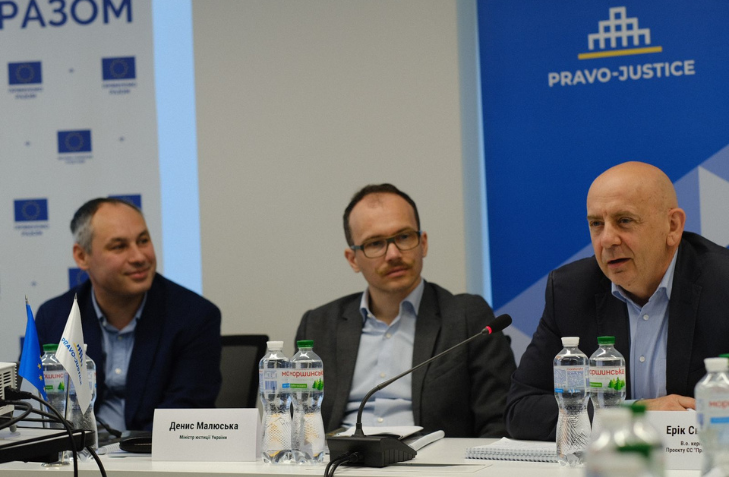ON JULY 18-19, THE MINISTRY OF JUSTICE OF UKRAINE PRESENTED A REPORT ON THE RESULTS OF OPERATIONAL MONITORING OF JUSTICE IN TIMES OF WAR, CONDUCTED WITH THE SUPPORT OF THE EU PROJECT “PRAVO-JUSTICE”, THE UKRAINIAN BAR ASSOCIATION AND OTHER PARTNERS. ITS PURPOSE IS TO IDENTIFY CONFLICTING, DECLARATIVE AND OUTDATED NORMS THAT REQUIRE URGENT LEGAL REGULATION DURING MARTIAL LAW.

“I am grateful to our partners from the Pravo-Justice Project, who support all our key activities, including the analysis of legislation and its monitoring.
Russia’s full-scale invasion of Ukraine is a great tragedy for the entire Ukrainian people. At the same time, from the legal point of view, this is a huge experience that no other country in the world has. This is of great interest to our partners: how we have modeled the justice system to withstand such extreme conditions, what changes have been made, and what else needs to be done. Legislation and international mechanisms related to the war are outdated, not detailed, and do not correspond to reality, to the extent that we had to improve them in our lawmaking work. Obviously, a lot has been achieved. However, it is necessary to look at the “outside” in time to see where there are gaps and what needs to be improved. In fact, this is exactly why the operational monitoring of justice in times of war was conducted.”Minister of Justice of Ukraine Denys Maliuska said in his opening remarks. “Due to the war, Ukraine is in an extremely difficult situation. This has a direct impact on the justice system and the legislative process. The first weeks and months required urgent decisions. However, now it is important to return to a systematic approach. Therefore, such monitoring involving a wide range of parties is very timely. And the fact that we have gathered here today shows that Ukraine is gradually overcoming difficulties and challenges and is approaching victory,” emphasized Erik Svanidze, c. о. Head of the EU Project “Pravo-Justice”. Over the course of two days, representatives of the Ministry of Justice, the Supreme Court, the judiciary, the bar, national experts from the EU Pravo-Justice Project, representatives of the Regional Justice Reform Councils and other stakeholders discussed the problems of legal regulation in wartime in the areas of judicial system, judicial proceedings, criminal justice, enforcement of judgments, forensic examination and bankruptcy. In total, 18 legal regulation issues were analyzed, each of which is described in detail in the monitoring report and presentations at the links below:
- A mechanism for operational monitoring of justice in times of war
- Operational monitoring of the implementation and analysis of the effectiveness of legal acts in the judiciary
- Operational monitoring in the field of justice
- Operational monitoring in the field of criminal justice
- Operational monitoring in the field of forensic science
- Operational monitoring in the area of decision implementation
- Operational monitoring in the field of bankruptcy
In analyzing each issue, we studied the state of its legal regulation, court practice, the practice of the European Court of Human Rights, research materials, international experience and statistical data. Based on the results, proposals for their solution are offered. The next step should be to develop urgent amendments to laws and other regulations in areas that require prompt legal regulation during martial law. “I would like to thank the Ministry of Justice and our long-term partners from the EU Pravo-Justice Project for this initiative. I assure you that the Legal Policy Committee is always ready to cooperate. If there are certain recommendations for improving the legislative changes that have taken place, I am confident that these developments will be analyzed by both the relevant committee and representatives of the judiciary in order to make appropriate changes that will make our judicial system more effective even in this difficult period.”Andriy Kostin, Chairman of the Verkhovna Rada Committee on Legal Policy, emphasized. According to Oleksandr Banchuk, Deputy Minister of Justice, the Ministry is open for further discussions and proposals on the necessary legislative changes: “Our task is to ensure high-quality legal regulation. This will mean that we will have better conditions for the functioning of justice and better protection of the rights of our citizens.” Those issues that were not included in the monitoring report but were discussed during consultations with stakeholders will be included in the annual monitoring for 2022.

